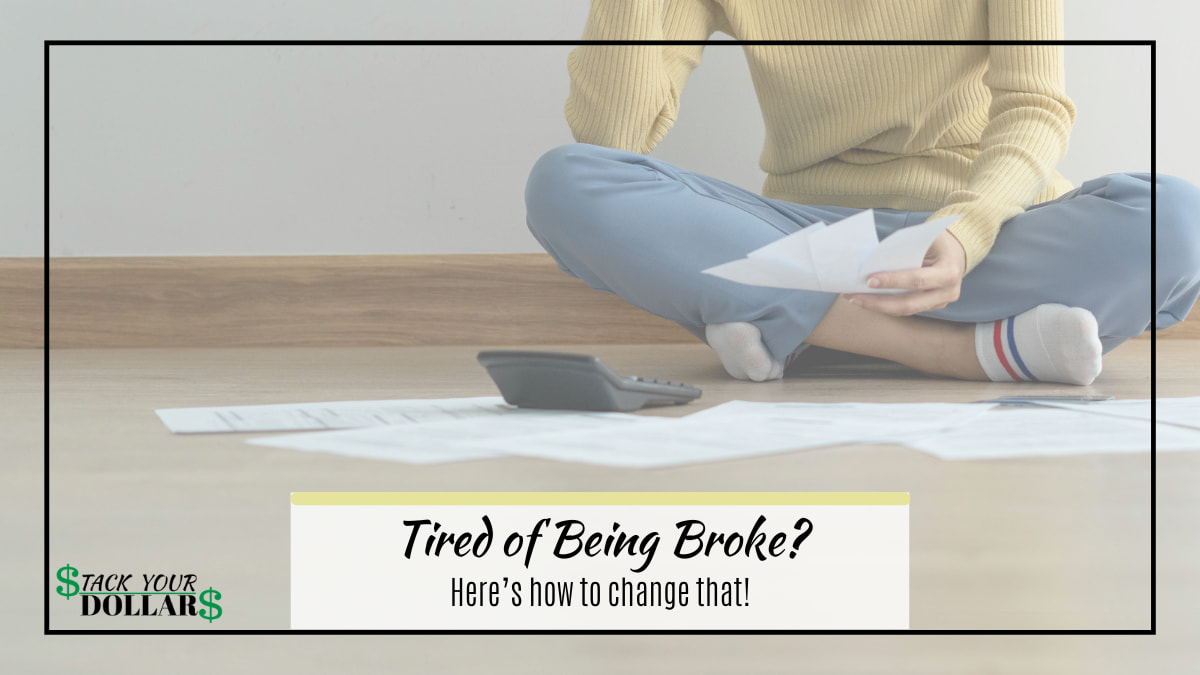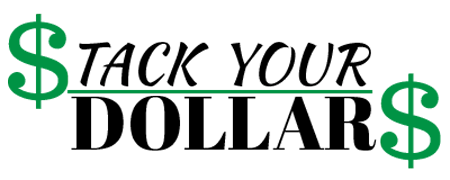Are you tired of being broke and feeling like your finances are stuck in a never-ending loop of struggle? Well, you’re not alone. Many people find themselves in a similar situation, yearning for a way out of the financial rut. Sadly, 73% of millennials (adults ages 27 to 42) are living paycheck to paycheck.

But fear not! Being and feeling broke does not define you. This article is your roadmap to breaking free from the chains of this negative emotion. Let’s explore practical tips, mindset shifts, and actionable steps to turn the tide and pave your way to financial freedom.
Tired of Being Broke: It’s Not Just You
We’ve all been there – the end of the month looming, bills piling up, and the bank account resembling a barren desert. The frustration of being broke can be overwhelming, leaving you questioning your financial decisions and wondering if there’s a way out.
Take a deep breath; you’re about to embark on a journey that can change your financial trajectory.
Why Does Being Broke Feel Like a Never-Ending Battle?
Ever wondered why it feels like you’re trapped in a financial Groundhog Day? Let’s break it down:
1. Living Beyond Your Means
You might be caught in the trap of trying to maintain a lifestyle that your income can’t support. Frequently eating out, the latest gadgets and expensive trips might be fun, but they can also be a fast track to financial ruin.
2. Ignoring the Budgeting Basics
Budgeting isn’t just for finance enthusiasts; it’s a lifesaver for anyone tired of being broke. If you don’t know where your money is going each month, it’s time to find out.
3. Emergency Fund MIA
Life is unpredictable, and emergencies don’t send a memo before knocking on your door. Without an emergency fund, unexpected expenses can ruin your monthly budget.
Shifting Mindsets: From Scarcity to Abundance
Embrace a Money-Positive Mindset
Are you constantly telling yourself, “I can’t afford this” or “Money is always tight”? It’s time for a mindset makeover. Start affirming positive beliefs about money. Repeat after me: “I will be debt-free. My savings will continue to grow and I will be financially secure.” and watch how your perspective shifts.
Here are more money manifestations to change your money mindset.
Ditch the Comparison Game
Social media often paints a distorted picture of wealth and success. Remember, not everything you see online reflects reality.
So how do we stop? How can we escape the habit of “Keeping Up With The Joneses”?
It starts with realizing that you are enough and that your belongings don’t define who you are. Focus on your financial journey and celebrate your small wins without comparing them to others.
Practical Steps to Financial Liberation
1. Budgeting 101
Ever heard of the saying, “If you fail to plan, you plan to fail”? Creating a budget is the first step towards financial freedom.
Start by tracking your expenses for a month and write down every penny you spend, then create a budget. List your monthly income, and all your expenses and do the math. You’ll likely spot areas where you can cut back after seeing how much you really spend.
I also like to add room to my budget for changing costs. For example, I always budget with the highest electricity bill I’ve received. Then I save the money from lower bills to pay for future ones, ensuring that a high bill doesn’t cause chaos.
2. Side Hustles
In a world filled with opportunities, why rely solely on a 9-to-5 job? Explore your hobbies and skills, and transform them into side hustles. Whether it’s freelance writing, graphic design, handmade crafts on Etsy, or tutoring, there’s a market for your talents.
3. Emergency Fund
Remember that time you got a parking ticket, your pet decided to have a medical crisis, and your apartment caught on fire—all in the same month? Yeah, I’ve been there too.
Life is unpredictable, and financial emergencies are inevitable. Establishing an emergency fund acts as a safety net, preventing you from spiraling into debt when unexpected expenses arise. Aim for at least three to six months’ worth of living expenses in your emergency fund.
Here are some examples of emergency expenses that you should prepare for and how to start building one.
4. Investing Wisely
Don’t let your money stagnate in a savings account as I did. Squirrel away money into low-risk investment options, such as CDs, mutual funds, or a diversified stock portfolio. Make your money work for you and watch it grow over time.
5. Debt Management
High-interest debt can be a significant roadblock to financial freedom. Take time to learn how to pay off debt faster.
Develop a debt repayment plan, prioritizing high-interest debts while making minimum payments on others. As you chip away at your debts, you’ll experience the liberating feeling of financial relief.
6. Passive Income Streams
Explore opportunities for passive income, where you earn money with minimal effort. This could include investments, creating online courses, or renting out property. Passive income streams can provide a steady financial influx, gradually reducing your dependence on active income.
My Own Journey Out of “Brokeville”
Question: So, how did I escape the never-ending cycle of being broke?
Answer: I had to learn how to live cheaply in all aspects of life. There are plenty of ways to save money if you’re willing to do the work. It took a mix of discipline, creativity, and a willingness to embrace change. Here are the steps I took:
1. Cutting Monthly Expenses
Spending less means being a bit uncomfortable, taking the time to shop around for better rates, and tackling projects by yourself. As I’m writing this, my home is 68.2 degrees in the winter and I have to wear my warm robe, but my electricity bill is only about $75 right now.
There are also many things I look up for how to do myself rather than hiring out services. I watched videos on how to change my own vehicle headlights and always do my own acrylic nails.
It’s not always the fastest or easiest way to get things done, but it is cost-effective!
2. Downsizing without the Drama
We downsized our living space, sold excess belongings, and embraced a minimalist lifestyle. It wasn’t just about saving money on rent and utilities; it was a mindset shift towards intentional living.
This intentional living approach meant fewer impulse purchases, a heightened awareness of our spending habits, and ultimately, a more conscious relationship with money.
3. Embracing the Art of Thriftiness
Thrift stores became my treasure troves. From clothing to furniture, I discovered that being frugal didn’t mean sacrificing style. It was about making wise choices that aligned with our financial goals.
Just this past weekend at a thrift store sale, I was able to get a nice wool coat for winter and an espresso machine for $1 each!
4. Investing in Financial Education
I devoured personal finance books, attended workshops, and listened to podcasts during my commutes. Knowledge truly is power, and understanding the principles of money management takes your finances to another level.
Conclusion
Being tired of being broke is the first step toward financial transformation. By shifting your mindset, adopting practical strategies, and making informed choices, you can pave the way to financial freedom.
Remember, it’s a journey, not a sprint. Stay committed, celebrate your progress, and watch as your financial landscape evolves. As Robert Kiyosaki said, “It’s not about how much money you make but how much money you keep, how hard it works for you, and how many generations you keep it for.” The power to change your financial destiny is in your hands, I believe in you!
FAQ
It’s never too late! While starting early is advantageous, making informed financial decisions and adopting a disciplined approach can lead to significant improvements at any age.
Create a spending plan, identify your financial goals, and think twice before making non-essential purchases. Delaying gratification can lead to better financial choices.
When used responsibly, credit cards can offer benefits like cashback and rewards. However, it’s crucial to pay off the balance monthly to avoid high interest charges.
Absolutely! Contact your service providers and negotiate better rates. Many companies are willing to work with customers facing financial challenges.
It depends on your situation. High-interest debt should be a priority, but having a small emergency fund while paying off debt is also crucial to avoid accumulating more debt in emergencies.
Explore freelancing, consulting, or monetizing your hobbies. The gig economy offers numerous opportunities to supplement your income without committing to a traditional job.
